Urban and Mobility Studies
The Urban and Mobility Studies programme explores diverse modalities and manifestations of urbanisation and social and spatial mobility in contemporary India. The programme’s research agenda focuses on urbanisation and social transformations; work and labour across different sectors; internal and international migration; rural-urban intersections and flows; skill development and social mobility; and health, gender and sexuality in the city.
Recent research projects have examined the linkages between labour migration, skill acquisition, and urban service sector employment; the urbanisation of rural landscapes; and transnational, transregional, and translocal networks and flows. The programme incorporates various disciplinary perspectives and methodological approaches, including sociology and social anthropology, political science and geography, as well as interdisciplinary areas of research including postcolonial urban studies, migration and transnational studies, and gender and sexuality studies

Assistant Professor

HONORARY VISITING PROFESSOR

Doctoral Student

DOCTORAL STUDENT

DOCTORAL STUDENT
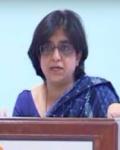
Honorary Visiting Professor
| Speculative Urbanism: Land, Livelihoods, and Finance Capital (2017-2023) Funded by the National Science Foundation (USA), the study is being carried out in collaboration with the University of Minnesota and UCLA (USA). It is a comparative study of changes in land use, property relations, livelihoods and urban ecologies in the context of rapid urban growth and the circulation of finance capital into the real estate sector, in Bangalore and Jakarta. For more information, please visit: https://www.speculativeurbanism.net/
|
| India’s Changing Cityscapes: Work, Migration and Livelihoods (2017-2019) Funded by the Indian Council for Social Science Research (ICSSR), the project was carried out in collaboration with the Institute for Social and Economic Change (ISEC), Bangalore. The study examined the linkages between migration, skilling, livelihoods and socio-economic mobility among low-end service sector workers in Bangalore. |
| ‘World-City’ Planning in Andhra Pradesh: A New Model for Urbanisation? (2016-2019) This study, supported by the Azim Premji Foundation, tracked the socio-economic transformations set in motion by the building of a greenfield city to serve as the new capital of residual Andhra Pradesh following state bifurcation. |
| Labour Supply Chains in the Construction Industry: Circular Migrants, Contracting, and Covid This two-year project, led by Dr. Aardra Surendran (IIT Hyderabad) and Carol Upadhya (NIAS) and funded by Azim Premji University, is documenting the pathways and modalities of circular labour migration in the construction industry, with a particular focus on labour contracting chains. |
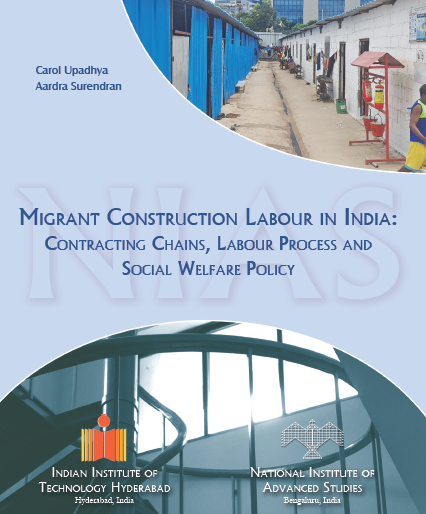
|
Carol Upadhya Migrant Construction Labour in India: Contracting Chains, Labour Process and Social Welfare Policy http://eprints.nias.res.in/3029/ Upadhya, Carol and Surendran, Aardra (2025) Migrant Construction Labour in India: Contracting Chains, Labour Process and Social Welfare Policy (NIAS/SSc/UMS/U/PR/01/2025). Project Report. NIAS & IITH, Bengaluru. |
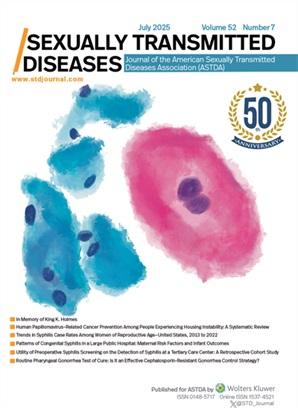
|
Aleena Sebastian Mpox Awareness and Vaccine Acceptability among Transgender Women and Men who have Sex with Men in India: Predictors and Implications for Outbreak Preparedness https://journals.lww.com/stdjournal/abstract/9900/mpox_awareness_and_vaccine_acceptability_among.569.aspx Chakrapani, V., Sebastian, A., Jyrwa, J. L. R., Kaur, J., Nelson, R., Shunmugam, M., ... & Patel, V. V. (2025). Mpox Awareness and Vaccine Acceptability among Transgender Women and Men who have Sex with Men in India. Sexually Transmitted Diseases, 10-1097 |
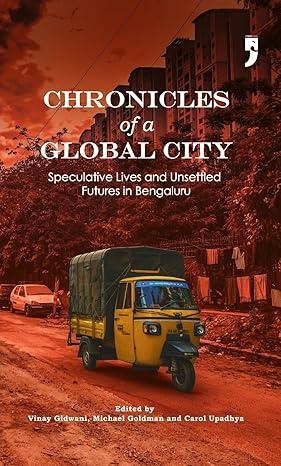
|
Carol Upadhya Chronicles of a Global City: Speculative Lives and Unsettled Futures in Bengaluru https://www.amazon.in/Chronicles-Global-City-Speculative-Unsettled/dp/9348566725 Co-Edited with Vinay Gidwani and Michael Goldman. Yoda Press Over the past two decades, Bengaluru’s exploding real estate sector and massive infrastructure investments have led to land speculation targeting working-class neighborhoods and agricultural land for development. Chronicles of a Global City turns Bengaluru inside out to examine its “world-city” transformation that stimulated rapid urbanization and unbounded growth. Moving the spotlight away from the urban elites and the new middle class, the essays in the volume explore how people caught up in the whirlwinds of change in Bengaluru—from construction laborers, street vendors, domestic workers, and platform delivery workers to small-time property brokers, petty landlords, and local politicians—experience, struggle, aspire, invent, strive and speculate to make a livable city for themselves. Grounded in long-term ethnographic research and activist experiences, Chronicles of a Global City vividly illuminates the multifaceted entanglements of finance capital, real estate markets, livelihood struggles, and fraying ecologies in urban and peri-urban Bengaluru. Its anchoring concept, “speculative urbanism,” provides a powerful, innovative lens for understanding the risk-laden practices of leveraging land, labor, and resources for the promise of future profit. Chronicles of a Global City was first published in 2024 by University of Minnesota Press. |
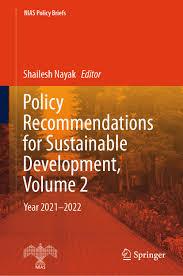
|
Supriya RoyChowdhury Urban Migration, Skilling, and Employment in the New Service Economy https://link.springer.com/chapter/10.1007/978-981-96-0718-1_1 Upadhya, C., Roy Chowdhury, S. (2025). Urban Migration, Skilling, and Employment in the New Service Economy. In: Nayak, S. (eds) Policy Recommendations for Sustainable Development, Volume 2. NIAS Policy Briefs. Springer, Singapore. |
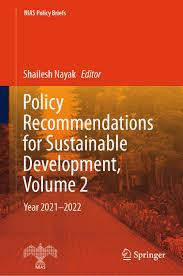
|
Carol Upadhya Urban Migration, Skilling, and Employment in the New Service Economy https://link.springer.com/chapter/10.1007/978-981-96-0718-1_1 Upadhya, C., Roy Chowdhury, S. (2025). Urban Migration, Skilling, and Employment in the New Service Economy. In: Nayak, S. (eds) Policy Recommendations for Sustainable Development, Volume 2. NIAS Policy Briefs. Springer, Singapore. |
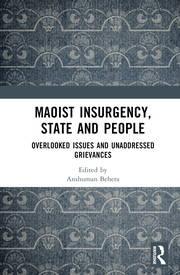
|
Aleena Sebastian Women and the invisible gender terrain of armed resistance in India https://www.routledge.com/Maoist-Insurgency-State-and-People-Overlooked-Issues-and-Unaddressed-Grievances/Behera/p/book/9781032454252 In: Maoist Insurgency, State and People: Overlooked Issues and Unaddressed Grievances (Edited by Anshuman Behera ). Routledge. ISBN 9781032454252 The gender dimension of armed conflict is marginal in the scholarship on Peace, Conflict, and Security Studies and requires further engagement through a feminist lens. It disrupts the notion that participation in these movements helps women escape patriarchy, and raises questions about the ‘ambivalent emancipation’ in India’s ‘Red Corridors.’ Through a historical and contextual reading of various resistance movements in South India and West Bengal, this paper explores how women navigate and negotiate varied socio-cultural and gender norms around women’s participation in the conflict. This reading is beyond the notion of women in conflict as passive participants or victims. |

|
Aleena Sebastian Assistant Professor, Urban and Mobility Studies Programme Matriliny, Merchandise and Islam: A Study of the Keyis in the Coastal Belt of Tellicherry, North Malabar https://journals.sagepub.com/doi/10.1177/26349817221147375 Coastal Studies and Society (Sage), As owners of extensive matrilineal joint households in the Tellicherry Coastal town (North Malabar, South India), Keyis upheld an urban-centred identity in the colonial period. Scattered around the coastal town of Tellicherry in Cannanore, the Keyis today form an economically diverse group. |
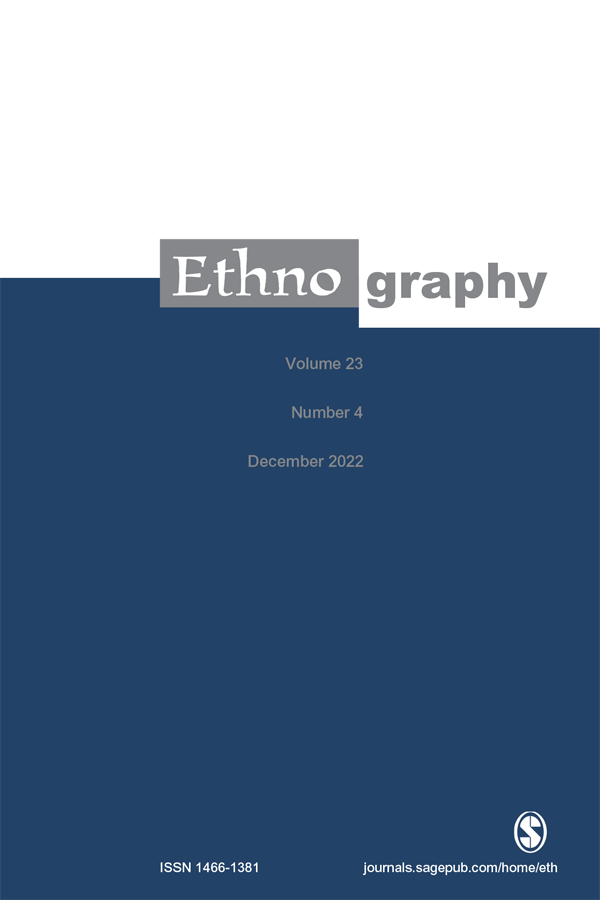
|
Aleena Sebastian Assistant Professor, Urban and Mobility Studies Programme Matrilineal practices among Muslims: An ethnographic study of the Minangkabau of West Sumatra https://journals.sagepub.com/doi/10.1177/14661381221147137 Ethnography (Sage) Matrilineal practices constitute an important aspect of the social organization among the Minangkabau Muslims of West Sumatra. Challenges were posed to the co-existence of customary practices and religious elements by specific regional and historic factors such as Dutch colonialism, the introduction of the money economy, Islamic reformism, legislative interventions, and other socio-economic transformations in colonial and post-colonial West Sumatra. |

|
Aleena Sebastian co-authored Assistant Professor, Urban and Mobility Studies Programme Mental health, economic well-being and health care access amid the COVID-19 pandemic: a mixed methods study among urban men who have sex with men in India https://www.tandfonline.com/doi/full/10.1080/26410397.2022.2144087 Co-authored with Venkatesan Chakrapani, Peter A Newman, Shruta Rawat, Sandeep Mittal, Vanita Gupta, and Manmeet Kaur. Sexual and Reproductive Health Matters, Vol. 30 (1) Scant empirical research from Asia has addressed the impact of COVID-19 on sexual minority health. We aimed to explore and understand the impact of COVID-19 on income security, mental health, HIV risk and access to health services among men who have sex with men (MSM) in India. We conducted a concurrent mixed methods study from April to June 2020, including a cross-sectional survey and in-depth semi-structured interviews with MSM recruited from three non-governmental organisations providing HIV prevention services in Chandigarh, India. We examined the associations of sexual minority stressors (sexual stigma, internalised homonegativity), economic stressors, and stress due to social distancing, with depression and anxiety, HIV risk, and access to health services. |

|
Chaitanya K co-authored Menstrual Experience of Transmen: A Study of Trauma, Taboo and Concealment http://www.inclusivejournal.in/posts/2022-08-spart-06.html Co-authored with Niyathi R. Krishna. In: Inclusive Journal, Vol. II, July - August 2022 |

|
Supriya RoyChowdhury City of Shadows: Slums and Informal Work in Bangalore https://www.cambridge.org/core/books/city-of-shadows/62F2AFDA7156630B83CC53C3F966BDF7 New Delhi;Cambridge University Press. ISBN:9781108989930 |

|
Carol Upadhya, Leah Koskimaki Professor and Head, Urban and Mobility Studies Programme Introduction: Transregional mobilities and provincial transitions in India In: C Upadhya, M Rutten and L Koskimaki (Eds), Provincial globalization in India: Transregional mobilities and development politics. London: Routledge |

|
Carol Upadhya Professor, Urban and Mobility Studies Programme Bangalore's 'Great Transformation' - The Problem Seminar 694, pp. 12-16 |

|
Carol Upadhya Professor and Head, Urban and Mobility Studies Programme A New Transnational Capitalist Class?: Capital Flows, Business Networks and Entrepreneurs in the Indian Software Industry Economic and Political Weekly 39: 5141–5151 |

|
Carol Upadhya Professor and Head, Urban and Mobility Studies Programme Community Rights in Land in Jharkhand Economic and Political Weekly 40: 4435–4442 |

|
Carol Upadhya Professor and Head, Urban and Mobility Studies Programme Employment, Exclusion and 'Merit' in the Indian IT Industry Economic and Political Weekly 42: 1863–1868 |

|
Carol Upadhya Professor and Head, Urban and Mobility Studies Programme Ethnographies of the Global Information Economy: Research Strategies and Methods Economic and Political Weekly 43: 64–72 |
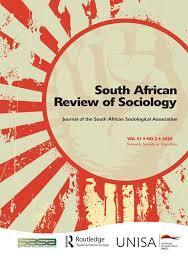
|
Carol Upadhya Professor and Head, Urban and Mobility Studies Programme Imagining India: Software and the ideology of liberalisation South African Review of Sociology 40: 76–93 |

|
Carol Upadhya Professor and Head, Urban and Mobility Studies Programme Migration, transnational flows and development in India: A regional perspective Economic and Political Weekly XLVII: 54–62 |

|
Carol Upadhya Professor and Head, Urban and Mobility Studies Programme Mario Rutten (1958-2015)- Obituaries Economic and Political Weekly 51(5): 96 |
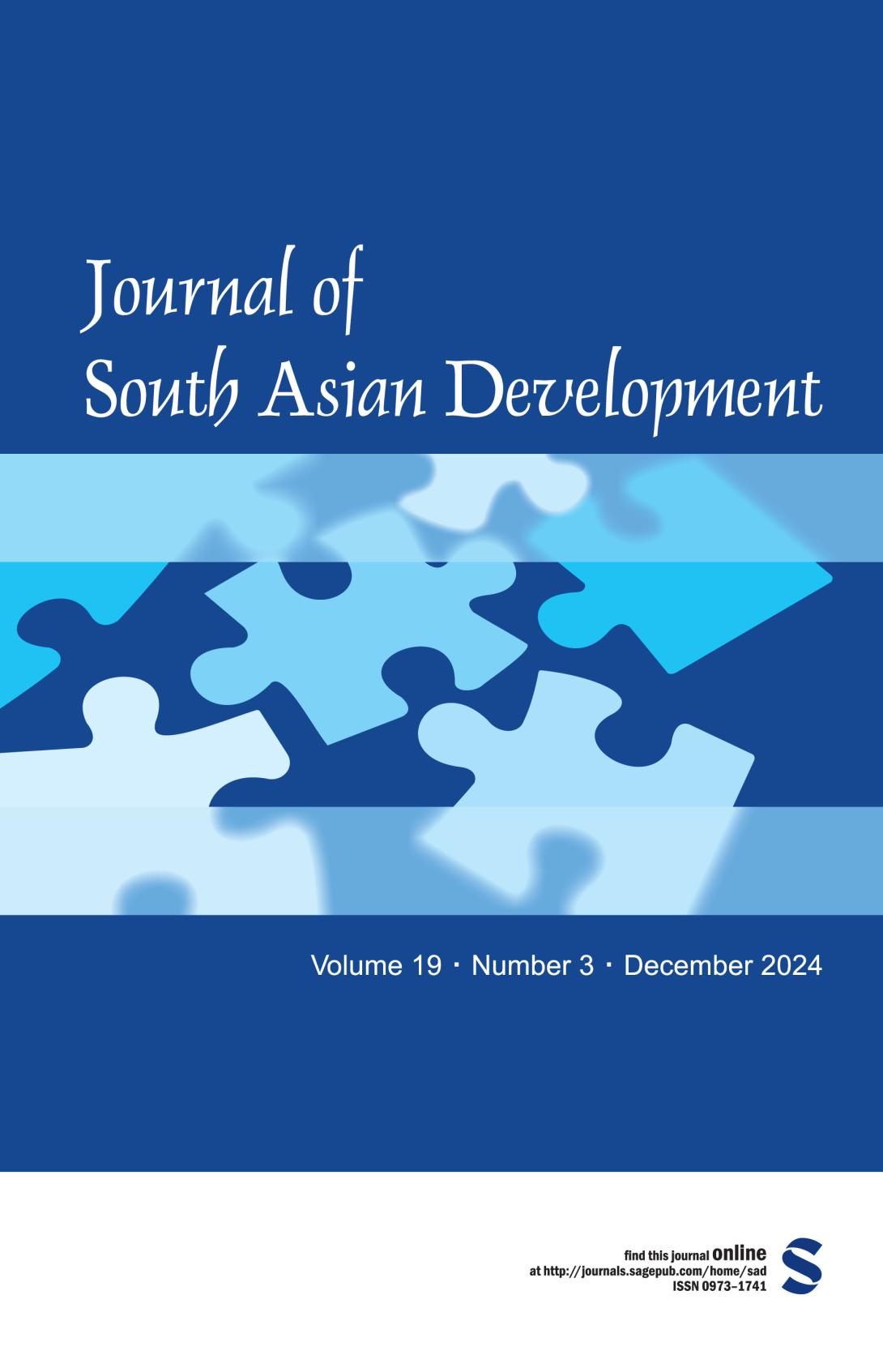
|
Carol Upadhya Professor and Head, Urban and Mobility Studies Programme Amaravati and the New Andhra: Reterritorialization of a Region Journal of South Asian Development 12(2), pp. 177-202 |
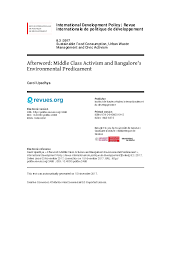
|
Carol Upadhya Professor and Head, Urban and Mobility Studies Programme Afterword: Middle Class Activism and Bangalore's Environmental Predicament International Development Policy Revue Internationale de Politique de Developpement 8(2) |
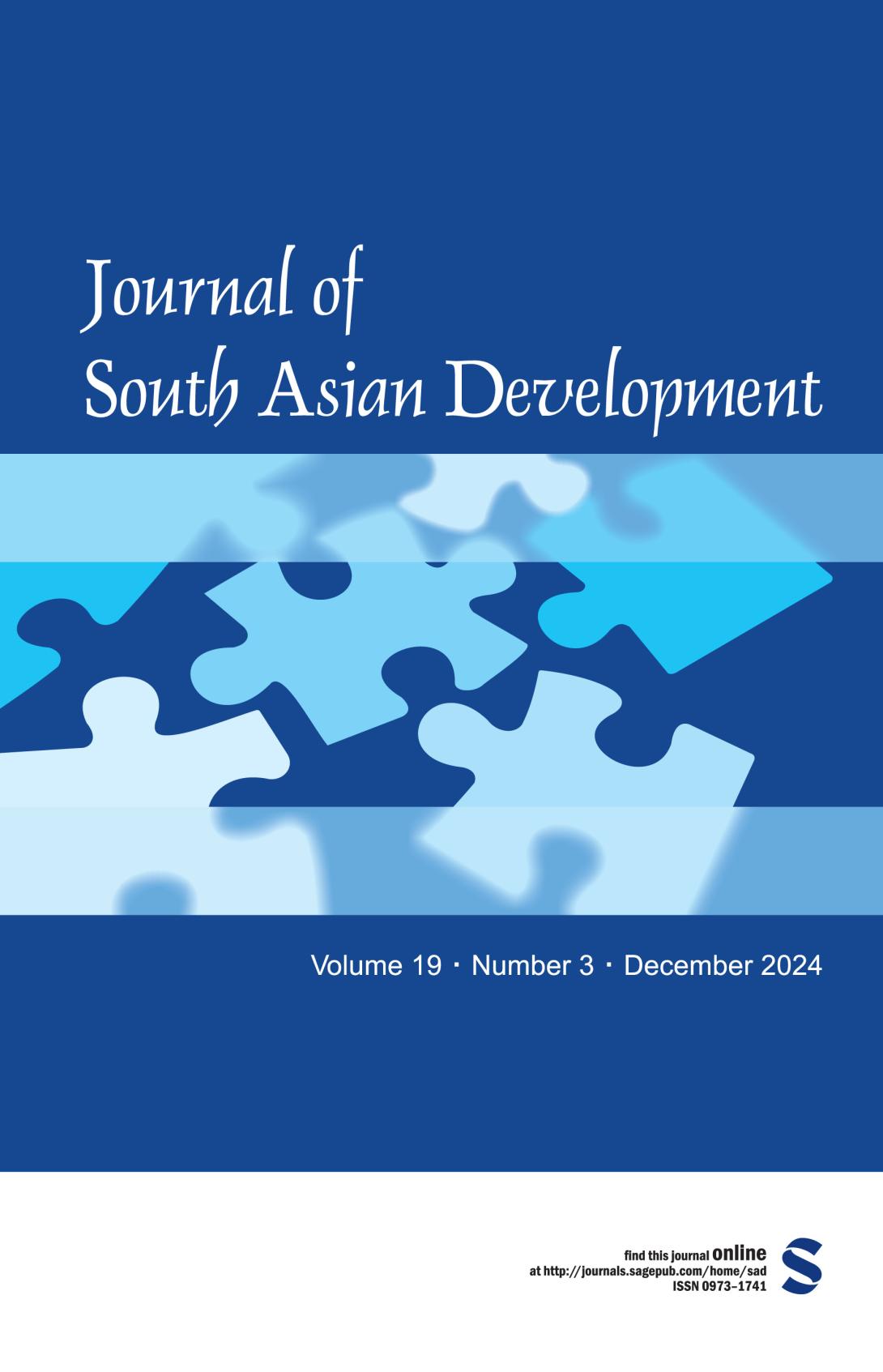
|
Carol Upadhya, Leah Koskimaki Professor, Urban and Mobility Studies Programme Introduction: Reconsidering the Region in India: Mobilities, Actors and Development Politics Journal of South Asian Development 12 (2 ): pp. 89-111 |

|
Carol Upadhya Professor and Head, Urban and Mobility Studies Programme Recasting Land: Agrarian Urbanism in Amaravati https://doi.org/10.1177/24557471211018304 Urbanisation. 6(1): 82- 103 |

|
Carol Upadhya Professor, Urban and Mobility Studies Programme Colonial anthropology, law, and adivasi struggles: The case of Jharkhand In: Doing sociology in India, Sujata Patel (Ed). New Delhi: Oxford University Press, pp. 266–289 |
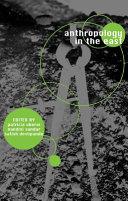
|
Carol Upadhya Professor, Urban and Mobility Studies Programme The idea of Indian society: G.S.Ghurye and the making of Indian Sociology In: Patricia Uberoi, Nandini Sundar, and Satish Deshpande (Eds). Anthropology in the East: Funders of Indian sociology and anthropology, Permanent Black, pp. 194–255 |

|
Carol Upadhya Professor, Urban and Mobility Studies Programme Management of Culture and Managing through Culture in the Indian Software Outsourcing Industry In: Carol Upadhya and AR Vasavi (Eds). An Outpost of the Global Economy: Work and Workers in India's Information Technology Industry, London: Routledge, pp. 101-135 |

|
Carol Upadhya Professor, Urban and Mobility Studies Programme Rewriting the Code: Software Professionals and the Reconstitution of Indian Middle Class Identity In: Christophe Jaffrelot and Peter Van der Veer (Eds). Patterns of middle class consumption in India and China, New Delhi: Sage, pp. 55–87 |
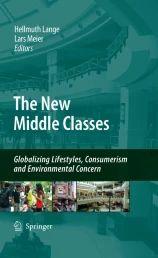
|
Carol Upadhya Professor, Urban and Mobility Studies Programme India's 'New Middle Class' and the Globalising City: Software Professionals in Bangalore, India In: Lars Meier and Hellmuth Lange (Eds). The New Middle Classes: Globalizing Lifestyles, Consumerism and Environmental Concern, Netherlands: Springer, pp. 253–268 |

|
Carol Upadhya Professor, Urban and Mobility Studies Programme Software and the 'new' middle class in the 'New India' In: Amita Baviskar and Raka Ray (Eds). Elite and everyman: The cultural politics of the Indian middle class, New Delhi: Routledge, pp. 167–192 |

|
Carol Upadhya Professor, Urban and Mobility Studies Programme Return of the ‘Global Indian’: Software professionals and the worlding of Bangalore In: Xiang Biao, Brenda Yeoh and Mika Toyota (Eds). Nationalizing transnational mobility in Asia. Duke University Press, Durham, pp. 141-161 |

|
Carol Upadhya Professor and Head, Urban and Mobility Studies Programme Shrink-wrapped souls: Managing the self in India’s new economy In: Nandini Gooptu (Ed). Enterprise culture in neoliberal India: Studies in youth, class, work and media, pp. 93-108 |

|
Carol Upadhya Professor, Urban and Mobility Studies Programme Employment, exclusion and ‘merit’ in the Indian IT industry In: Satish Deshpande (Ed). The Problem of Caste: Essays from Economic and Political Weekly, pp. 141-151 |
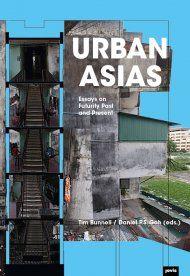
|
Carol Upadhya Professor, Urban and Mobility Studies Programme Capitalizing on the Future: Negotiating Planned Urbanization in South India https://ari.nus.edu.sg/publications/urban-asias-essays-on-futurity-past-and-present/ In: Tim Bunnell & Daniel PS Goh (Eds). Urban Asias: Essays on Futurity Past and Present, pp 169-182. Berlin: JOVIS Publishers |

|
Carol Upadhya Professor, Urban and Mobility Studies Programme Ghurye, Govind Sadashiv (1893–1983) In: The International Encyclopedia of Anthropology, JohnWiley & Sons, Ltd |
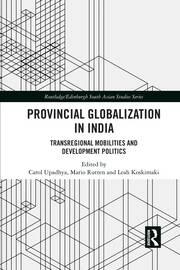
|
Carol Upadhya Professor and Head, Urban and Mobility Studies Programme A love for land: transregional property investments in Andhra https://www.routledge.com/Provincial-Globalization-in-India-Transregional-Mobilities-and-Development/Upadhya-Rutten-Koskimaki/p/book/9780367589165 In: C Upadhya, M Rutten and L Koskimaki (Eds). Provincial globalization in India: transregional mobilities and development politics, London: Routledge |

|
Carol Upadhya Professor, Urban and Mobility Studies Programme Cultures of work in India's new economy https://in.sagepub.com/en-in/sas/critical-themes-in-indian-sociology/book266097 In: Sanjay Srivastava,Yasmeen Arif and Janaki Abraham (Eds), Critical themes in Indian sociology, New Delhi: Sage |

|
Carol Upadhya Professor and Head, Urban and Mobility Studies Programme Rural Real Estate: Empty Urbanisation and the Agrarian Land Transition https://global.oup.com/academic/product/neoliberalism-urbanization-and-aspirations-in-contemporary-india-9780190132019?cc=in&lang=en In: Sujata Patel (Ed). Neoliberalism, Urbanization and Aspirations in Contemporary India, New Delhi: Oxford University Press, 2021 |

|
Carol Upadhya, Supriya RoyChowdhury Professor and Head, Urban and Mobility Studies Programme Migration, skilling, and employment in Bengaluru’s new service economy Economic & Political Weekly 57(4): 40-46, 2022 |

|
Carol Upadhya, Deeksha M Rao Dispossession without displacement: Producing property through slum redevelopment in Bengaluru, India https://doi.org/10.1177/0308518X221073988 Environment and Planning A: Economy and Space, 2022 |
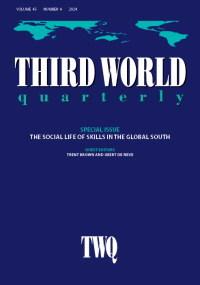
|
Carol Upadhya, Supriya RoyChowdhury Professor and Head, Urban and Mobility Studies Programme Crafting new service workers: skill training, migration and employment in Bengaluru, India https://doi.org/10.1080/01436597.2022.2077184 Third World Quarterly, 2022 |

|
Carol Upadhya, Vinay Gidwani co-authored Professor and Head, Urban and Mobility Studies Programme Articulation work: Value chains of land assembly and real estate development on a peri-urban frontier https://doi.org/10.1177/0308518X221107016 Environment and Planning A: Economy and Space, 2022 |
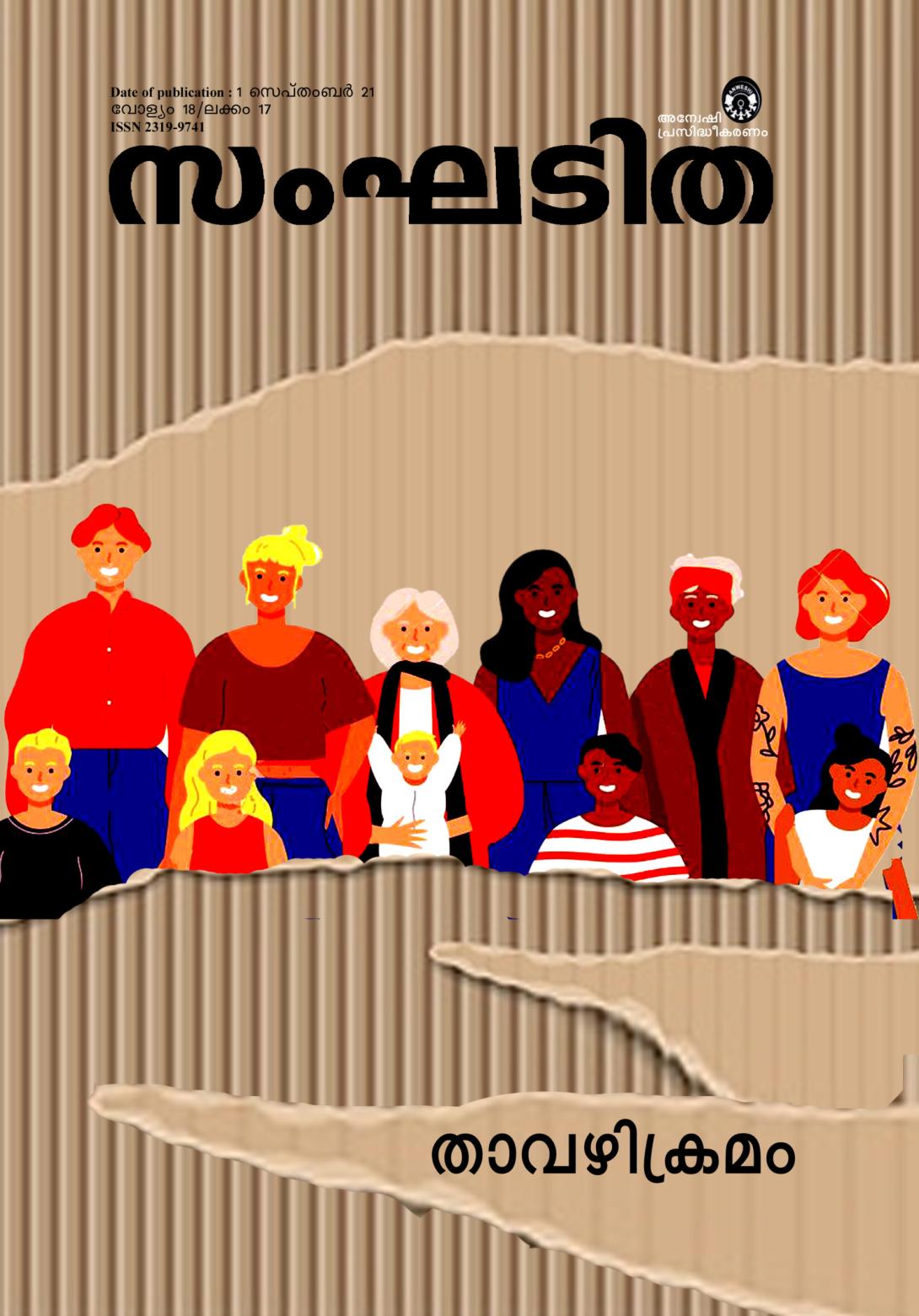
|
Aleena Sebastian Assistant Professor, Urban and Mobility Studies Programme Opinion: "Change and continuity in the matrilineal practices among the Koyas of Kozhikode" https://www.sanghaditha.com/kozhikode-koyamarkidayile/ |
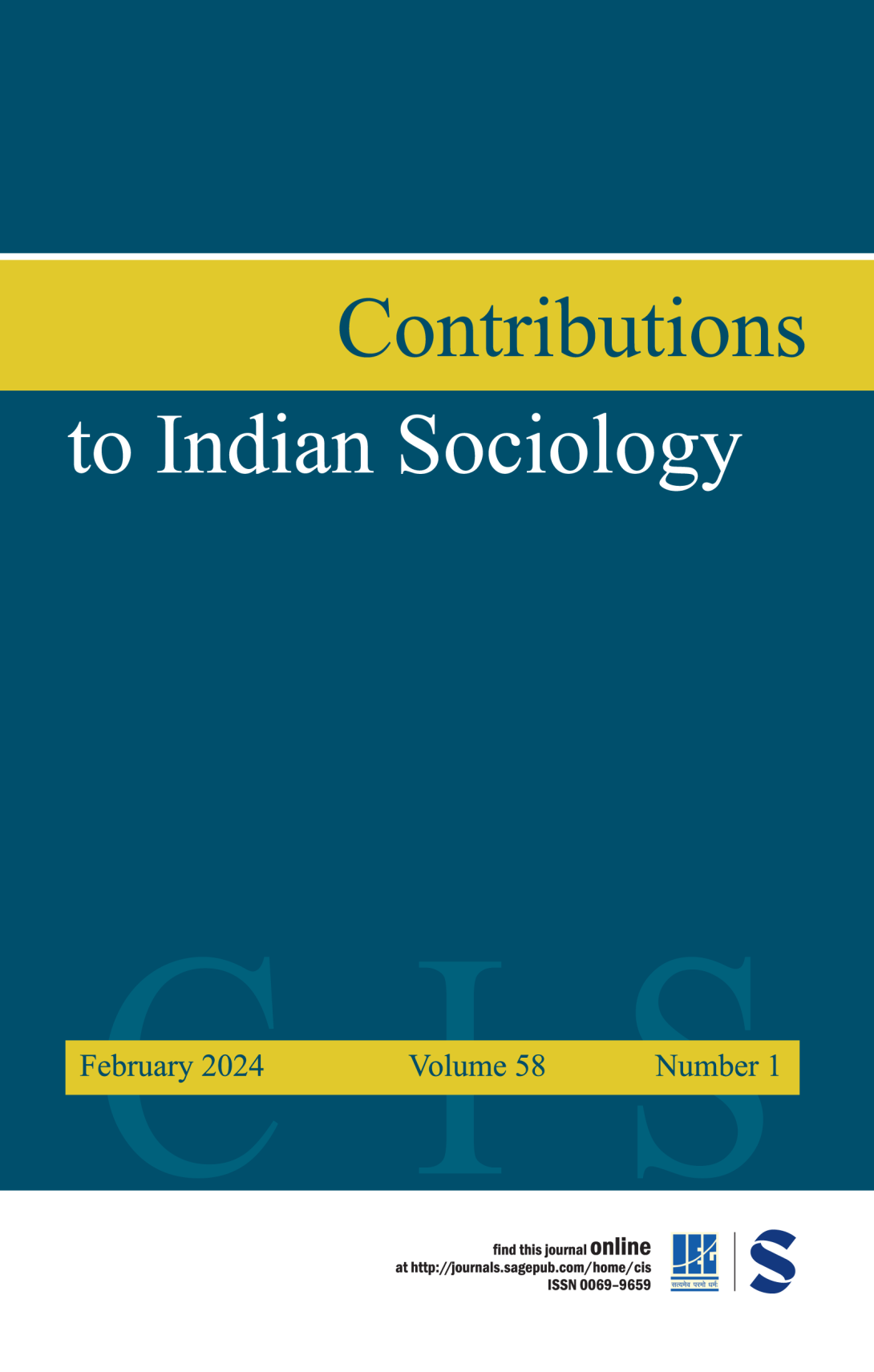
|
Aleena Sebastian Assistant Professor, Urban and Mobility Studies Programme Book Review: Hem Borker, Madrasas and the making of Islamic womanhood https://journals.sagepub.com/doi/10.1177/0069966719860368 Oxford University Press, 2018 |
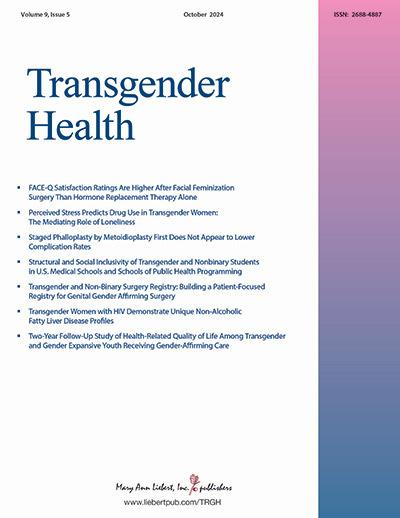
|
Aleena Sebastian co-authored Associate Professor, Urban and Mobility Studies Programme The impact of COVID-19 on economic well-being and health outcomes among transgender women in India. Transgender Health https://www.liebertpub.com/doi/abs/10.1089/trgh.2020.0131 |
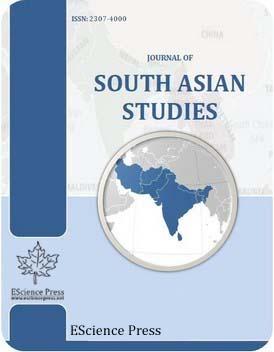
|
Aleena Sebastian Associate Professor, Urban and Mobility Studies Programme Matrilineal practices among Koyas of Kozhikode https://esciencepress.net/journals/index.php/JSAS/article/view/113 |

|
Aleena Sebastian Assistant Professor, Urban and Mobility Studies Programme Matrilineal practices along the coasts of Malabar https://doi.org/10.1177%2F0038022920160106 |

|
Aleena Sebastian Assistant Professor, Urban and Mobility Studies Programme Matrilineal Minangkabau: A critique of the universal theory of kinship and gender relations https://www.rawatbooks.com/women-studies/gender-and-work Rawat Publications, 2018 |

|
Aleena Sebastian Assistant Professor, Urban and Mobility Studies Programme State and legal reform: A study of matrilineal Mappila Muslims of Malabar https://orientblackswan.com/details?id=9789390122004. Orient Blackswan, 2020 |

|
C S Vijayashree Perpetual metamorphosis: Feminist re-imagination of two Hindu themes ICON, NMI Journal of History of Art 4: 90-100. |
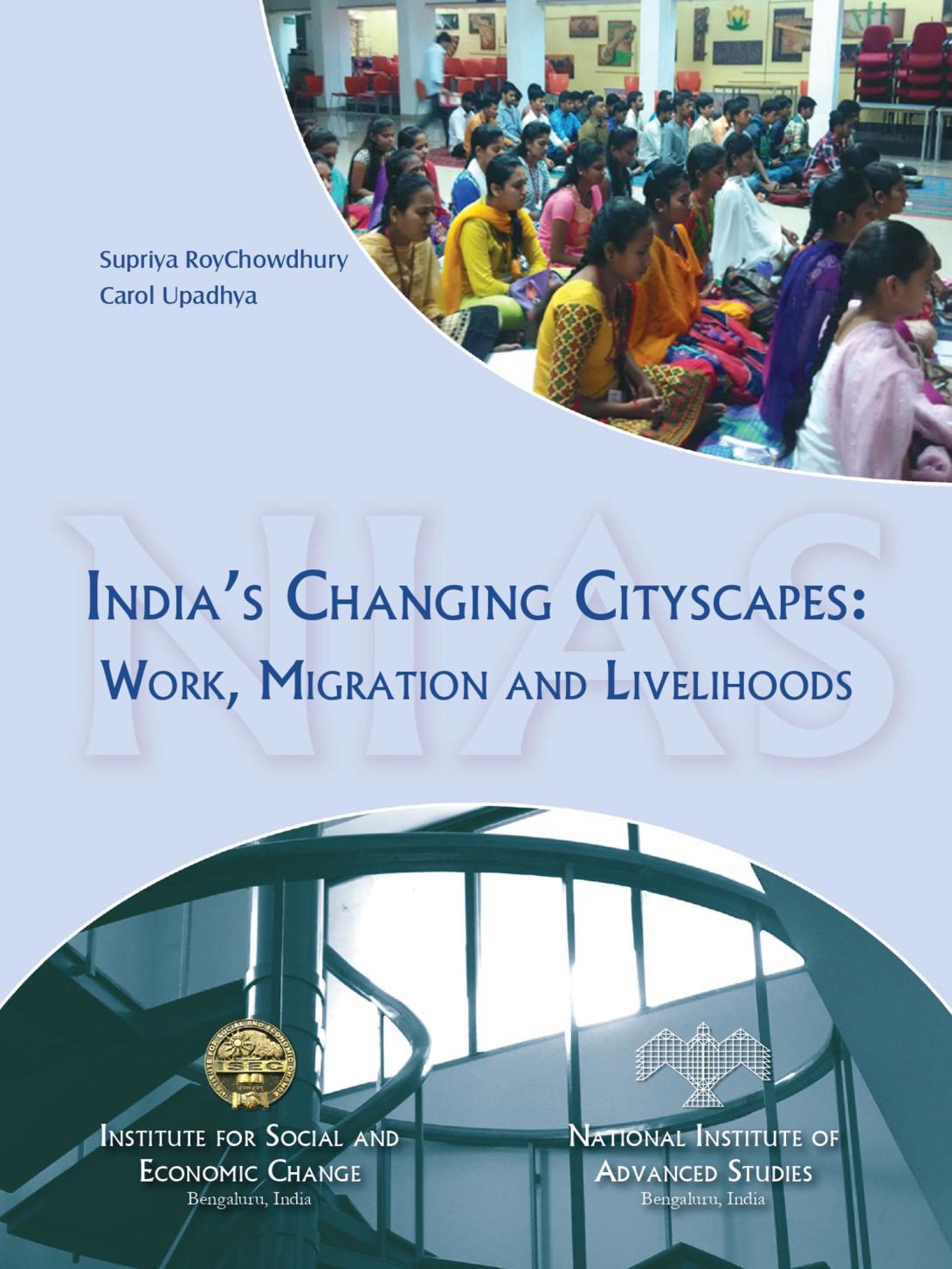
|
Carol Upadhya, Supriya RoyChowdhury co-authored Carol Upadhya is Professor and Head; Supriya RoyChowdhury is Honorary Visiting Professor, Urban and Mobility Studies Programme India’s changing cityscapes: Work, migration and livelihoods (NIAS Research Report No. NIAS/SSc/UMS/U/RR/01/2020). Bengaluru: ISEC and NIAS. |
| |
Snehashish Mitra PhD Scholar, Urban and Mobility Studies Programme BJP gains in Bengal, Assam: New regime of citizenship? https://www.deccanherald.com/opinion/main-article/bjp-s-gains-in-bengal-assam-763525.html Deccan Herald, 23 September 2019 |

|
Snehashish Mitra PhD Scholar, Urban and Mobility Studies Programme Will it be a saffron surge in Bengal? https://www.outlookindia.com/website/story/anticipating-a-saffron-surge-in-bengal/330592 Outlook, May 19, 2019 |
| |
Shruthi H M Sastry Karnataka: Huge skill gap could hamper industry revival https://sable.madmimi.com/c/55583?id=383051.8455.1.661aa93afb77fd0e2103a70a2476d2ac Deccan Herald. May 10, 2020 |
| |
Snehashish Mitra PhD Scholar, Urban and Mobility Studies Programme Cyclone in the Sundarbans; Of relief work and resilience https://www.epw.in/journal/2021/2/postscript/cyclone-sundarbans.html Economic & Political Weekly 56(2): 64-66, 2021 |
| |
Snehashish Mitra PhD Scholar, Urban and Mobility Studies Programme Trotting on the terrace https://www.deccanherald.com/opinion/right-in-the-middle/trotting-on-the-terrace-883644.html Deccan Herald, September 7, 2020 |

|
Carol Upadhya Professor and Head, Urban and Mobility Studies Programme Skill training has become a numbers game https://www.deccanherald.com/india/skill-training-has-become-a-numbers-game-836134.html Deccan Herald |
| |
The Urban Service Workforce Will Be the Next Casualty of the COVID-19 Lockdown https://thewire.in/labour/covid-19-lockdown-urban-service-workers The Wire, May 22, 2020 |

|
Snehashish Mitra PhD Scholar, Urban and Mobility Studies Programme I Have an Exam Tomorrow Economic & Political Weekly 54(16): 64, 2019 |
| |
Snehashish Mitra, Soma Ghosal Frontier Towns in the Spatial Dynamics of Trade, Capital and Conflict: From Look East to Act East In Global Governance and India's North-East: Logistics, Infrastructure and Society, 197-227. Routledge, 2020. |
| |
Snehashish Mitra, Ranabir Samaddar PhD Scholar, Urban and Mobility Studies Programme Bridge of spaces: East by rear east Global Governance and India's North-East: Logistics, Infrastructure and Society, 177-197. Routledge, 2019 |
| |
Snehashish Mitra PhD Scholar, Urban and Mobility Studies Programme Out-migration and labour mobility: Case studies from Assam V. Xaxa, D. Saha and R. Singha (eds), Employment and Labour Market in North-East India: Interrogating Structural Changes. New Delhi: Routledge India, 2018 |
| |
Keya Bardalai PhD Scholar, Urban and Mobility Studies Programme Professional identities and servile realities: Aspirational labour in Delhi malls https://doi.org/10.1177/00699667211005495 Contributions to Indian Sociology 55(2): 200-223 |

|
Carol Upadhya, Sachinkumar Rathod Professor, Urban and Mobility Studies Programme Caste at the City’s Edge: Land Struggles in Peri-urban Bengaluru https://doi.org/10.4000/samaj.7134 In: South Asia Multidisciplinary Academic Journal, Special Issue on Urban Peripheries, pp. 01-28 |
| |
Devika Narayan Through the Optics of Finance: Speculative Urbanism and the Transformation of Markets https://doi.org/10.1111/1468-2427.13012 International Journal of Urban and Regional Research |
| |
Dispossession by Financialization: The End(s) of Rurality in the Making of a Speculative Land Market https://doi.org/10.1080/03066150.2020.1802720 The Journal of Peasant Studies, October |
| |
Hemangini Gupta, Kaveri Medappa Nostalgia as Affective Landscape: Negotiating Displacement in the ‘World City’ https://doi.org/10.1111/anti.12674 Antipode |

|
Carol Upadhya Professor, Urban and Mobility Studies Programme Assembling Amaravati: Speculative accumulation in a new Indian city https://www.tandfonline.com/doi/abs/10.1080/03085147.2019.1690257?journalCode=reso20 Economy and Society 49(1): pp. 141-169 |
| |
Snehashish Mitra PhD Scholar, Urban and Mobility Studies Programme Dwelling on the Hills: Continuity of Tribal Geographies in Guwahati CEPT Essay Prize 2019, 95-105. CEPT University Press, 2020 |
| |
Keya Bardalai PhD Scholar, Urban and Mobility Studies Programme Malls versus streets: North-Eastern Women between modernity and marginality South Asia: Journal of South Asian Studies 42 (6): 1078-1094, 2019 |
| |
Sanderien Verstappen Mobility and the region: Pathways of travel within and beyond Central Gujarat Journal of South Asian Development 12(2): 112-135, 2017 |
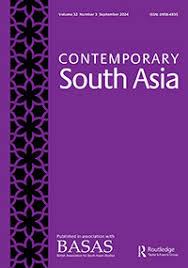
|
Carol Upadhya Professor and Head, Urban and Mobility Studies Programme Engineering equality? Education and im/mobility in coastal Andhra Pradesh, India https://www.tandfonline.com/doi/abs/10.1080/09584935.2016.1203863 Contemporary South Asia, pp. 1-15 |
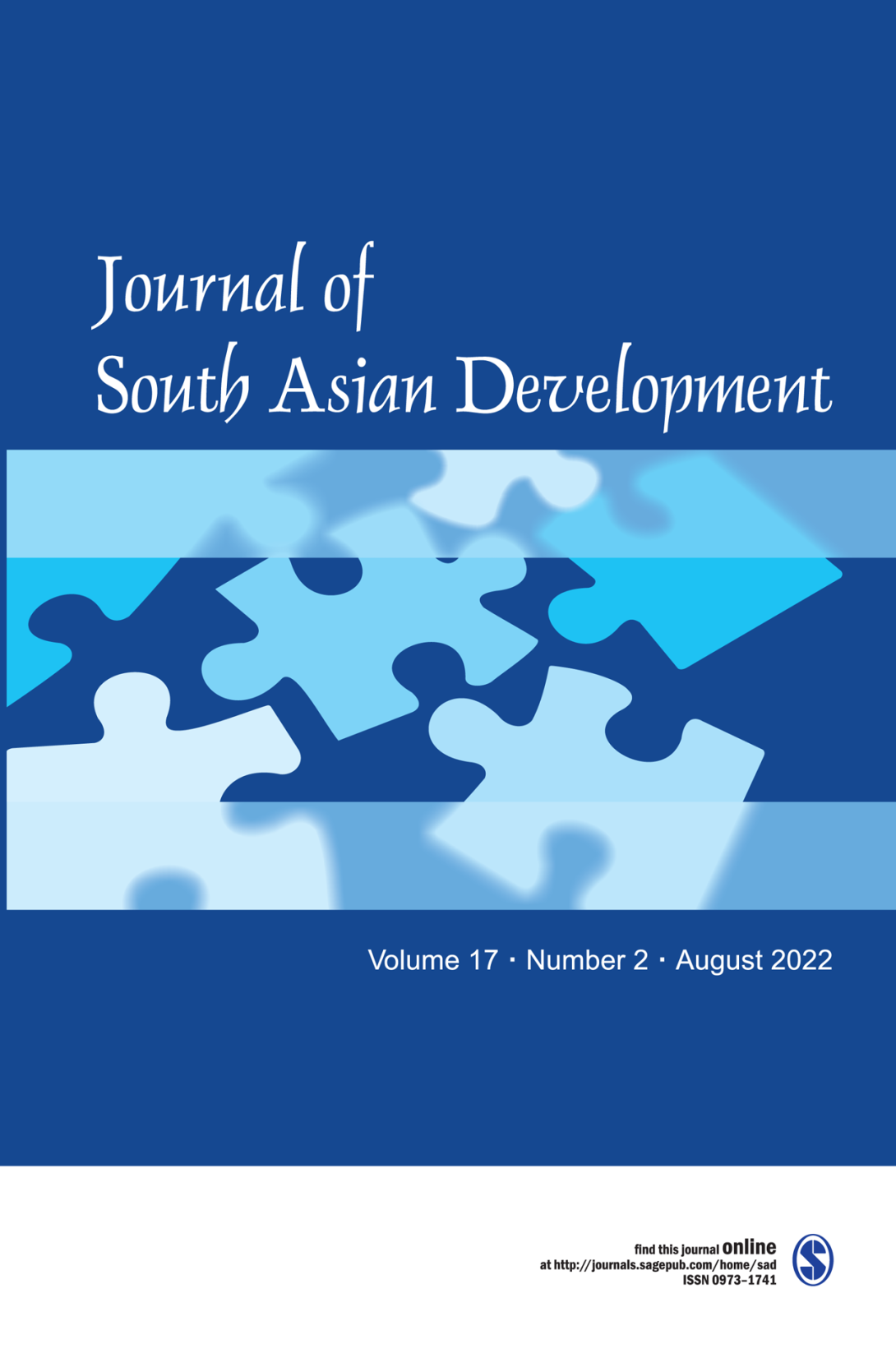
|
Carol Upadhya, Leah Koskimaki co-authored Special Issue on ‘Reconsidering the Region in India’ https://journals.sagepub.com/toc/sada/12/2 Journal of South Asian Development 12(2), August 2017 |
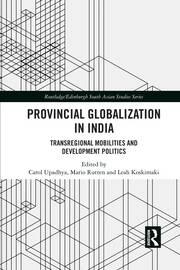
|
Carol Upadhya, Mario Rutten, Leah Koskimaki Professor and Head, Urban and Mobility Studies Programme Provincial Globalization in India: Transregional Mobilities and Development Politics https://www.routledge.com/Provincial-Globalization-in-India-Transregional-Mobilities-and-Development/Upadhya-Rutten-Koskimaki/p/book/9780367589165 Routledge, London: Edinburgh South Asian Studies Series, 2018 |
| |
Bangalore’s Great Transformation co-edited issue of Seminar, June 2017 |
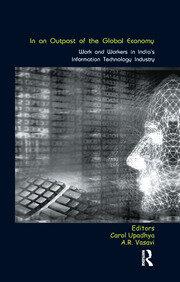
|
Carol Upadhya, A R Vasavi co-edited Professor and Head, Urban and Mobility Studies Programme In an Outpost of the Global Economy: Work and Workers in India’s Information Technology Industry https://www.routledge.com/In-an-Outpost-of-the-Global-Economy-Work-and-Workers-in-Indias-Information/Upadhya-Vasavi/p/book/9780367176136 Edited Volume. New Delhi: Routledge, 2008 |

|
Carol Upadhya Reengineering India: Work, Capital, and Class in an Offshore Economy https://oxford.universitypressscholarship.com/view/10.1093/acprof:oso/9780199461486.001.0001/acprof-9780199461486 Delhi: Oxford University Press |
| |
Carol Upadhya, Supriya RoyChowdhury Carol Upadhya is Professor and Head; Supriya RoyChowdhury is Honorary Visiting Professor, Urban and Mobility Studies Programme Urban Migration, Skilling and Employment in the New Service Economy https://cms.nias.res.in/sites/default/filesefs/2022-03/2021-PB-01-Carol-Upadhya.pdf Reports, 2021, NIAS/SSc/UMP/U/PB/01/2021 |
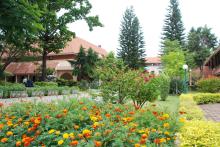
|
NIAS Urban Lecture Series 2023 (Online) Reconfiguring Privilege and Social Inequalities: Understanding Elite Strategies in Bikaner Town in India Dr. Suraj Beri , Assistant Professor, Dept. of Sociology, Nagaland Central University Online 08th Aug 2023 |

|
NIAS Urban Lecture Series 2023 (Online) (Trans)forming Community-Building in Indian Science Institutions Sayantan Datta (they/them) , Faculty Teaching Associate, Krea University Online 10 July 2023, 15:30 hrs |

|
NIAS Urban Lecture Series 2023 (Online) The road to safety- Examining the nexus between road infrastructure and crime in rural India Dr. Ritika Jain , Assistant Professor, Centre for Development Studies, Trivandrum Urban and Mobility Studies Programme Online 04 Jul 2023, 15:30 hrs |

|
NIAS Urban Lecture Series 2023 (Online) Neo-Kinship: Understanding the Transcendency of Group Formation in the Urbanity Dr. Sipoy Sarveswar, Assistant Professor of Anthropology, Visva-Bharati Central University, Shantiniketan Urban and Mobility Studies Programme Online 30 May 2023, 15:30 hrs |

|
NIAS Urban Lecture Series 2023 (Online) The Making of a ‘Heritage City’: Predicaments of Development Practices in Ahmedabad Shahul Ameen KT Urban and Mobility Studies Programme Online 27 Apr 2023, 15:30 hrs |

|
NIAS Urban Lecture Series 2023 Urban entanglements in the global city of Singapore: Negotiating intimacies and religious embodiments amongst diasporic Tamil Hindu women Dr. Ranjana Raghunathan Urban and Mobility Studies Programme Online 28 Mar 2023, 15:30 hrs |
The Programme has organised three popular outreach series of lectures and events: ‘City at its Limits’, ‘Public Feminisms’, and ‘Changing India’. Lectures, film screenings and workshops attracted large audiences and prompted spirited debate and discussion.
To disseminate the findings of the Speculative Urbanism project, a multi-media exhibition entitled ‘Speculative Urbanism’ was put up at Rangoli, a public gallery in Bangalore, from July 27–August 8, 2019, and again at the Indian Institute of Human settlements from September 26 – October 5, 2019. The exhibit featured photography, material artefacts, video, and text from our project. It received strong media coverage and made the key themes of our research -- the operation of land markets, the entanglement of real estate and finance capital, the ecological impacts of real estate on the city, and livelihood impacts -- available to a wider public.
A workshop was held at NIAS on July 20, 2019 on housing rights, attended by invited academics, housing justice activists, policy makers, and students, as part of the Speculative Urbanism Programme.
Hemangini Gupta convened a panel, ‘Speculative Urbanism in the Asias: Infrastructures, Aesthetics, Politics’ at the Association for Asian Studies in Asia conference, Bangkok, Thailand, July 1, 2019. Dr. Gupta presented a paper, ‘Towards a Lexicon for the World City: Keywords from Bengaluru and Jakarta. Prof. Carol Upadhya was the discussant for the panel.
The Speculative Urbanism team gave a public presentation based on our comparative fieldwork titled ‘Jakarta Sinking, Bengaluru Parched: Conversations on the Intersections between Land, Water, Finance, and Planning’, at Ashirvaad, Bangalore, July 29, 2019, organised by the Environment Support Group.
City at its Limits event series (funded by NSF grant):
Prem Chandavarkar (Managing Partner, CnT Architects), ‘The Smart City and the Indian Urban Condition’, November 3, 2017
Malini Ranganathan (Assistant Professor, American University), ‘Situated Ethics of the City: Narrating Corruption and Land in Contemporary Urban India’, February 2, 2018
Naresh Narasimhan (Architect, Bangalore): ‘Contrapuntal view: Tactical urbanism in Bengaluru’. June 13, 2018
T.V. Ramachandra (IISc): ‘Lessons of unplanned urbanization: Bengaluru, a dying city (with burning and frothing lakes)’. October 12, 2018
Nikhil Anand (Anthropology, University of Pennsylvania): ‘City of waters: On leaks, sewage and the uncertain sea’. December 20, 2018
Public Feminisms Lecture Series:
Ashwini Tambe (University of Maryland): ‘Academic feminism, public feminism, and #MeToo’. July 4, 2018
Radhika Govinda (Edinburgh University): ‘Towards a renewal of feminist politics? “Bad girls”, everyday sexism and activist campaigns in millennial India’. January 8, 2019
V. Geetha (feminist writer and activist, Chennai): ‘Speaking of assault: Expressions and their histories’. March 20, 2019
Changing India event series (supported by Pratiksha Trust):
Arvind Narrain (Alternative Law Forum, Bengaluru): ‘Transformative constitutionalism and the decriminalisation of the right to love’. September 24, 2018.
Prof. Rahamath Tarikere (Kannada University Hampi): ಕರ್ನಾಟಕದ ಅನುಭಾವಿ ಪಂಥಗಳು: ಜನತಾ ಧರ್ಮಗಳು (Mystic Cults as Peoples' Religion). October 11, 2018.
Ashish Kothari (Kalpavriksh): ‘Development, environment and human rights: Towards sustainability and equity’. October 30, 2018.
Mukul Sharma (Indian Institute of Mass Communication, New Delhi): ‘“Green and Blue”: Caste, Dalits and Indian environmentalism’. November 16, 2019.
V. Geetha (feminist writer and activist, Chennai): ‘Speaking of assault: Expressions and their histories’. March 20, 2019.
Workshop on Languages of Caste: Assertion, Denial and Resistance, February 12, 2019, with invited speakers from across south India. The objective of the workshop, organized by a group of NIAS PhD students from across Schools mentored and supported by Prof. Carol Upadhya, was to explore the role of language in the assertion, denial and resistance of caste. Speakers included Ms. Gogu Shyamala (Hyderabad), Prof. Satyanarayana (EFLU, Hyderabad), Prof. S. Anandhi (MIDS, Chennai), Hulikunte Murthy from Bayalu Balaga, Shilpa Mudbi Kothakota from the Urban Folk Project, Malavika Priyadarshini, NIAS-Exeter PhD student, Asim Siddiqui, A. Manasa and M. Hemanth Kumar from Azim Premji University and Gowri, a social justice activist.
Jhuma Sen (Assistant Professor, Jindal Global Law School), ‘Narrative as Justice: Imagining Feminist Justice from #MeToo to Feminist Judgments Projects’, July 12, 2019.
Patrick Inglis, Assistant Professor of Sociology, Grinnell College (USA), ‘Narrow Fairways: Getting by and Falling Behind in the New India’, October 21, 2019.
Anand Pandian (Professor, Johns Hopkins University, USA), ‘Walled In: An Anthropological Look at the Politics of Exclusion in Contemporary America’, January 8, 2020.
